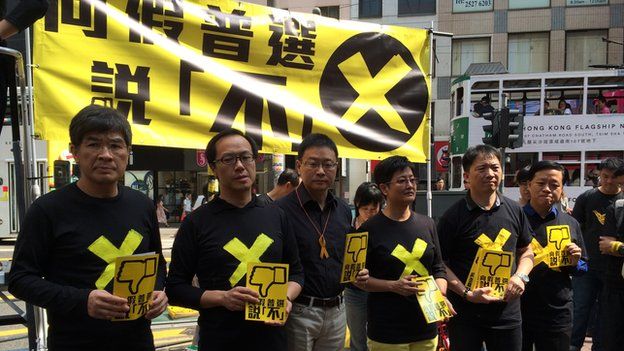Why are Hong Kong's proposed electoral changes so controversial?
- Published

At least 11 democracy activists in Hong Kong were arrested over the weekend, allegedly for vandalism or assaulting police officers. It came a few days after the Hong Kong government unveiled a highly controversial proposal for selecting the city's next chief executive by one person, one vote in 2017. If the election happens, it would be an unprecedented political event on Chinese soil.
What exactly is the government's proposal?
The proposal outlines how the next chief executive will be elected by some five million voters in Hong Kong. It sticks to a decision made last August by the Standing Committee of China's parliament, which said voters would have a choice from a list of only two or three candidates selected by a nominating committee.
The nominating committee is composed of 1,200 members from four major sectors. The same committee was used to elect the current Chief Executive, CY Leung, in 2012.
In order to add a greater element of competition, the rules also spell out a "primary run-off" to take place within the nominating committee. A person recommended by at least 120 members of the committee, and a maximum of 240 members, is entitled to seek nomination in the primary.
So five to 10 people could, in theory, seek nomination. In a second vote, committee members can approve of them as they like. The two or three contenders who obtain the endorsement of more than half of the committee will make it on to the public ballot.
Why are the democracy demonstrators so upset?
They are demanding what they call a genuine choice of candidates. They believe there is no chance for candidates with more liberal political views to be shortlisted for the public ballot because the nominating committee is composed of members largely loyal to the Chinese Communist Party.
They say attempts to increase the numbers of contenders in the primary race are just for show. They do not think it will have any impact on the kind of candidates who will be able to run in the general election.
Can the proposal be amended?
The Hong Kong government has indicated there is little room to alter the proposal. For an election to take place, the plan must be passed by members of the Legislative Council, Hong Kong's de facto parliament, with a two-thirds majority.
The council currently has 70 members, so 47 votes are needed to pass the plan. The council has 27 members who are part of the pro-democracy movement. They have all promised to vote against the proposal. At the moment, the government seems to be short by at least four votes. The authorities are actively lobbying those lawmakers to change their positions.
No date has yet been set for the vote, though it is expected sometime around June.
How broad is public support for the government proposal?
Hong Kong society is extremely polarised on this question.
Government officials have cited at least one recent opinion poll by the University of Hong Kong showing that approximately half of respondents support election reforms based on the Chinese government's decision from last August. But that poll had a relatively small sample size of just 500.
For a more thorough gauge of public opinion, three universities in Hong Kong have jointly begun polling citizens daily on whether or not they support the government proposal. They aim to collect 200 responses each day, until just before the vote in the Legislative Council.
What is mainland China's role in the proposal?
A Hong Kong government source has confirmed that there was a "continuous dialogue" with mainland Chinese officials during the drafting of the proposal. Official Chinese media has heaped praise on the plan and warned democrats not to vote against it, saying Hong Kong should not miss the opportunity for universal suffrage.
What happens if lawmakers fail to pass the proposal?
If the Hong Kong government fails to persuade at least four lawmakers from the democracy camp to change their votes, the proposal will not pass. That means the next chief executive election will run as it has done in the past. The members of the 1,200-strong election committee will choose Hong Kong's leader.
- Published22 April 2015
- Published18 June 2015
- Published4 September 2023